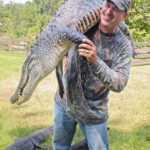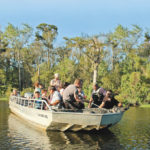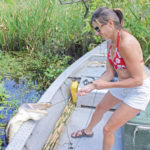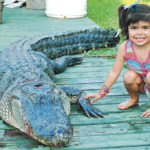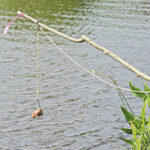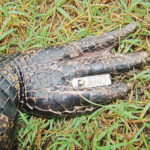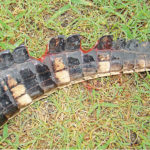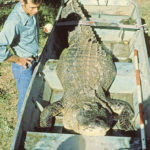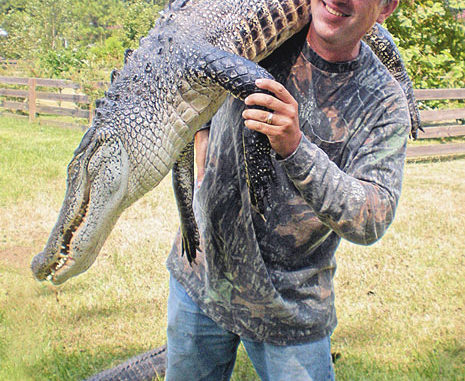
July is month to apply for public-land alligator tags
When out-of-state people think about Louisiana, they think, “Alligators.” Louisiana has long had a reputation for alligators and alligator hunting. Most of us older folks remember Jerry Reed’s song, “Amos Moses was a Cajun, he lived by hisself in the swamp, he hunted alligators for a livin’, just knocked ‘em in the head with a stomp.”
I am not sure what a “stomp” is, but it must be deadly. Lord knows Louisiana has a tremendous alligator resource. Even local residents are often surprised to learn there are few bodies of water in the state that do not have alligators in them.
Biologists with the Louisiana Department of Wildlife and Fisheries (LDWF) estimate the alligator population in the state at around 2 million animals. Populations are considered stable. Louisiana definitely has no shortage of alligators.
Many people have seen the reality series “Swamp People” on television. The show has given the general public a rather skewed view of alligator hunting. Life and death struggles in the swamp by leathery backwoods folks is not exactly typical of alligator hunting.
Alligator hunting, if done correctly, is exciting and can be a lot of fun, but seldom involves all the drama and dangers portrayed on TV.
Sorry.
The one thing the program has done is to generate a great interest in alligator hunting. LDWF has been flooded by calls from individuals wanting to go alligator hunting. The common folks want to give it a try, but most don’t have a place to go.
An alligator hunter has traditionally been required to have access to private property to get tags. Tags are then issued based upon acres of suitable alligator habitat and corresponding alligator abundance.
While public alligator hunting has been allowed on a handful of lakes for nearly 30 years, until recently there has not been much opportunity for the general public to participate.
All this changed three years ago when LDWF decided to open a number of its wildlife management areas to “recreational” gator hunting through a lottery drawing. The number of public lakes available was also greatly expanded. It should be pointed out, all alligator hunting is technically a commercial activity. Hides may be harvested and sold. Lottery hunters are just limited to two or three tags, and are often subject to additional regulations.
Lance Campbell, program manager for the Coastal & Nongame Resources Division (CNR), forecasts a positive demand for alligator hides this coming season. Last year, the statewide average price was $13/foot. He thinks hide prices may be somewhat higher this year, ranging from $13 to $18/foot.
“Prices are not a major concern for most lottery hunters,” he said. “Most of them are doing it for fun, to have an alligator hunting experience and to get some meat.
“There are dozens of excellent recipes out there, but I probably like chicken frying the meat in small bite-size pieces best.”
Alligator trapping is fun. Everyone who participated in the lottery hunt last year professed to having a thoroughly good time. Many of the hunters had jobs and were only able to trap on weekends. These individuals would set their hooks on a Friday afternoon and run them on Saturday and Sunday. The hooks would then be removed for the week.
Jeremey Charbonnet was selected to hunt on Pearl River WMA last year. He didn’t have any previous experience alligator hunting, but had always wanted to give it a try. On one occasion, he checked one of his lines and thought the hook was hung on an underwater stump. He pulled as hard as he could, and 10 minutes later, a huge alligator surfaced. He ran back and got his whole family and a pile of kids from his church to help.
When he got back he found the gator had crawled up on the bank. When he went up ashore to shoot, it rolled and broke the 700-pound line. Only a snap shot at the water’s edge prevented its escape. He described the incident as “exciting.”
Another hunter, Eric Paille, also participated in the lottery hunt on Pearl River WMA. He caught an 8 foot, 8-inch gator. When he looked at the contents of the stomach he found two alligator webtags from smaller gators, released by alligator farms, that it had eaten. It appears alligators are not overly discriminant eaters.
There are three different alligator lottery applications a Louisiana resident may apply for:
1. Wildlife Division Wildlife Management Areas;
2. Coastal & Nongame Resources (CNR) Division Wildlife Management Areas;
3. Public Lakes.
Applications must be submitted by early July, so don’t wait. Applications may be downloaded from the department website (wlf.louisiana.gov/hunting/lottery-hunts) or can be obtained from the Baton Rouge or nearest regional office. A non-refundable application fee of $5 must accompany the application. Applicants must be legal Louisiana residents, at least 16 years of age and have a Hunter Safety Card or be accompanied by an adult who has a valid hunting license or Hunter Safety Card.
Successful applicants for Wildlife Division and CNR WMAs will be issued three alligator tags each. Public-lakes hunters will receive two tags per hunter. Non-residents are not eligible for any of the three drawings. An individual may apply for only one WMA or public lake. He may not send in all three applications.
Biologist Program Manager Randy Myers is in charge of coordinating the lottery hunts for the Wildlife Division’s WMAs around the state. He says the object of the lottery hunts is to allow the general public to have an alligator-hunting experience, not to make a lot of money. In the past couple of years, if hunters could even sell the hides, the money barely covered costs. Lottery hunters do it for the fun and to get some alligator meat.
No previous alligator hunting experience is required for the hunts. Prospective hunters should have access to a boat and motor, although there are a few WMAs, such as Pearl River, where hunters have taken gators off of Highway 11 using a canoe.
Myers emphasized that while alligator hunting is a lot of fun, the activity is highly regulated by state and federal laws. Regulations on the WMAs must be strictly followed if one is to avoid running afoul of the law.
• Season dates for the lottery hunts are:
Sept. 7-Oct. 6 at Boeuf, Big Lake, Buckhorn, Red River, Three Rivers
Sept. 10-29 at Joyce, Manchac, Maurepas Swamp, Pearl River, Elm Hall
Sept. 12-29 at Pass A Loutre, Point Aux Chenes, Salvador/Timken, Atchafalaya Delta
Sept. 17-Oct. 6 at Sherburne, Grassy Lake, Spring Bayou.
• Successful applicants will be required to attend a training meeting. At this meeting, they will be required to watch a video on alligator hunting procedures and regulations. They will purchase an Alligator Hunting License ($25) and pay an additional $120 fee for the tags. Hunters will also sign an Alligator Hunting Agreement.
• Only persons drawn for the lottery hunt, and their licensed helpers, may set hooks and dispatch alligators. The person selected by lottery drawing must be present when setting hooks and dispatching alligators. Onlookers are not required to have an alligator license. However, all adults entering the WMA must have one of the following: 1) a valid Louisiana Hunting License, 2) a valid Louisiana Fishing License, or 3) a valid Wild Louisiana Stamp. Licensed hunters must have current hide tags and a copy of the agreement in their possession.
• Hooks may be set only on WMA property.
• Permittee may hunt the entire WMA, except for restricted areas. A hook may not be set within 50 feet of another hook. All lines must be flagged and have a tag affixed with the hunter’s name and alligator license number.
• Method of take — Fishing method only. Pole fishing (tie a hook on a pole and poke around in a hole attempting to hook a gator and drag it out), free-shooting and archery are prohibited. Sport hunting is not allowed. Stainless hooks are prohibited. Alligators may not be killed with a shotgun.
• Only two lines may be set for each tag in possession.
• A typical set involves a baited (chicken, beef melt) hook approximately 12 to 18 inches above the water level, with 40 to 50 feet of line secured to a tree or anchored pole.
• Lines must be checked daily, in early morning, and alligators promptly removed.
• Alligators can only be harvested and removed from lines during daylight hours, between official sunrise and official sunset.
• Alligators may be dispatched only with a rifle or pistol; .22 caliber is recommended. The possession of shotguns is prohibited while hunting or taking wild alligators.
• Alligators must be tagged immediately upon taking (utilizing the tag’s locking device) before moving from the location where the alligator was caught.
• Hunters are required to record length and sex of alligators taken.
• Any marked alligators caught must be reported. Commercial alligator egg collections are conducted on a number of the WMAs by alligator farms. Part of the agreement requires a percentage of the alligators to be returned to the location the eggs were collected. These returned alligators have been marked, by cutting of tail scutes and attachment of metal toe webbing tags. The department uses data from these marked gators to monitor growth and survival rates.
• Hunters must account for all unused tags, and harvest reports must be returned to the department after the season.
The regulations and opening dates on public lakes may differ from WMAs, and no tag fee is required.
